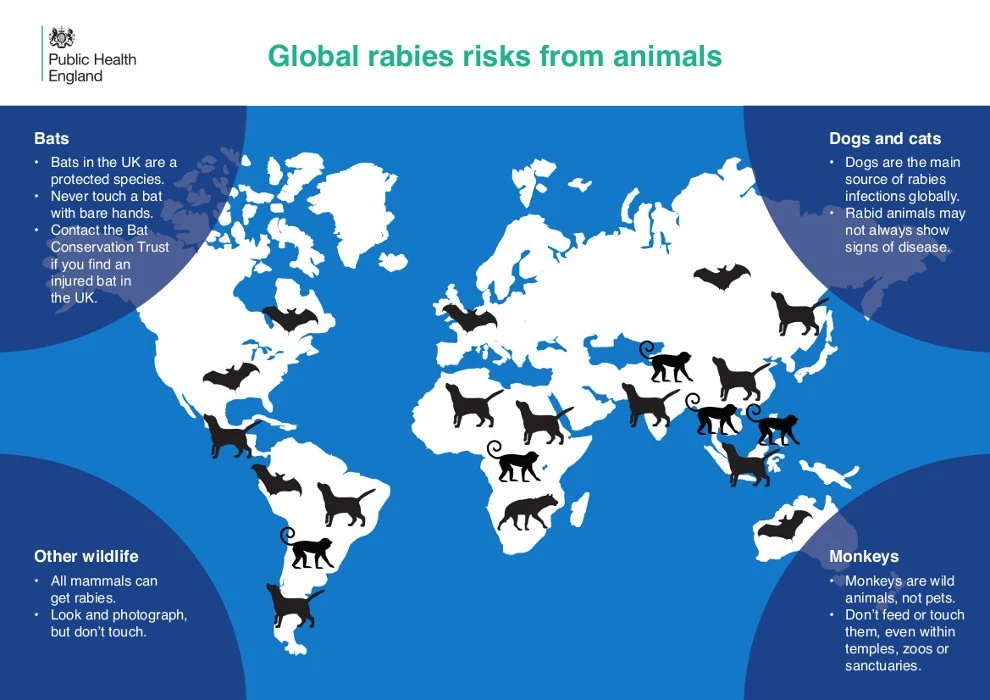
Be Rabies Aware
WORLD RABIES DAY: 28th SEPTEMBER (CELEBRATED ANNUALLY)
World Rabies Day is here! Celebrated annually in September, World Rabies Day raises awareness about rabies prevention and highlights the progress being made to defeat this awful disease. Read on to learn more about the disease, and how you can help protect yourself from rabies when travelling.
Rabies: Share the message. Save a life. #BeRabiesAware
What is rabies?
- Rabies is a serious viral disease that is passed to humans through a bite or scratch from an infected animal, usually a dog1
- Once symptoms develop, rabies is almost always fatal. It is estimated that worldwide, rabies causes one death every nine minutes (59,000 deaths annually)1,4
For more information on rabies, including symptoms, click here.
Am I at risk of getting rabies while travelling?
- Rabies exists across the globe (except on Antarctica), although the risk of getting rabies is highest in places where the virus is present in dogs, such as countries in Africa and Asia1
- Cases of rabies are generally rare in travellers, but animal bites and scratches are not1
- Travellers should be aware of the risks and know what to do if they are bitten or scratched1
Every year, approximately 2000 people in England require treatment for a potential rabies exposure. The majority of these cases are for travellers that were exposed to an animal overseas.2 However, more than 10% of these cases result from potential bat exposure in the UK.2 It is also important to seek medical advice if you are bitten by, or have close contact with, a bat in the UK.
Read on to see what you can do to help protect yourself against rabies.
How can I help protect myself from getting rabies?
What to do before you travel
Consider getting vaccinated against rabies, particularly if:3
- Medical treatment may be in short supply where you’re going
- You’ll be doing activities such as cycling or running
- You’re staying for more than one month
Speak to your doctor or nurse before you travel – they’ll be able to advise you on whether you should get vaccinated before you go.
Actions to take while you are travelling
- Be careful around animals (wild and domesticated) – minimise your risk of being bitten or scratched2
- If you are bitten, seek immediate medical advice. Effective post-exposure treatment is available, if given rapidly after the potential exposure2
- You should also immediately wash any wounds with soap and water for several minutes, and apply a disinfectant and dressing to the wound1
Which animals can carry rabies?
- All warm-blooded animals, such as dogs, cats, monkeys, bats and other wildlife can develop rabies2
- It’s crucial that travellers are aware of potential rabies risks from animals so that they can avoid putting themselves in harm’s way2
- It’s recommended to avoid touching or feeding animals when travelling, as this will help to reduce the risk of being bitten, scratched, or licked by an animal carrying rabies2
The map below shows some of the animals that can pass rabies on to humans.2

Adapted from Public Health England.
© Crown copyright 2018 – PHE Publications Gateway Number: 2018320
The World Health Organization is dedicated to eliminating human rabies transmitted by dogs by 20304 – help achieve this goal – #BeRabiesAware
Zero by 30: the global strategic plan to end human deaths from dog-mediated rabies by 2030 (who.int).
References
1. Travel Health Pro. Rabies. Available at: https://travelhealthpro.org.uk/factsheet/20/rabies. Accessed February 2024. 2. Public Health England. Vaccine Update: Issue 282. August 2018. Available at: https://www.gov.uk/government/publications/vaccine-update-issue-282-august-2018-rabies-special-edition. Accessed February 2024 3. Public Health England. Rabies: The Green Book. Chapter 27. Available at: https://www.gov.uk/government/publications/rabies-the-green-book-chapter-27. Accessed February 2024 4. WHO. Zero by 30: the global strategic plan to end human deaths from dog-mediated rabies by 2030. Available at: https://www.who.int/publications/i/item/9789241513838. Accessed February 2024
MAT-XU-2204303(v2.0) | February 2024
For further information please talk to your healthcare professional

